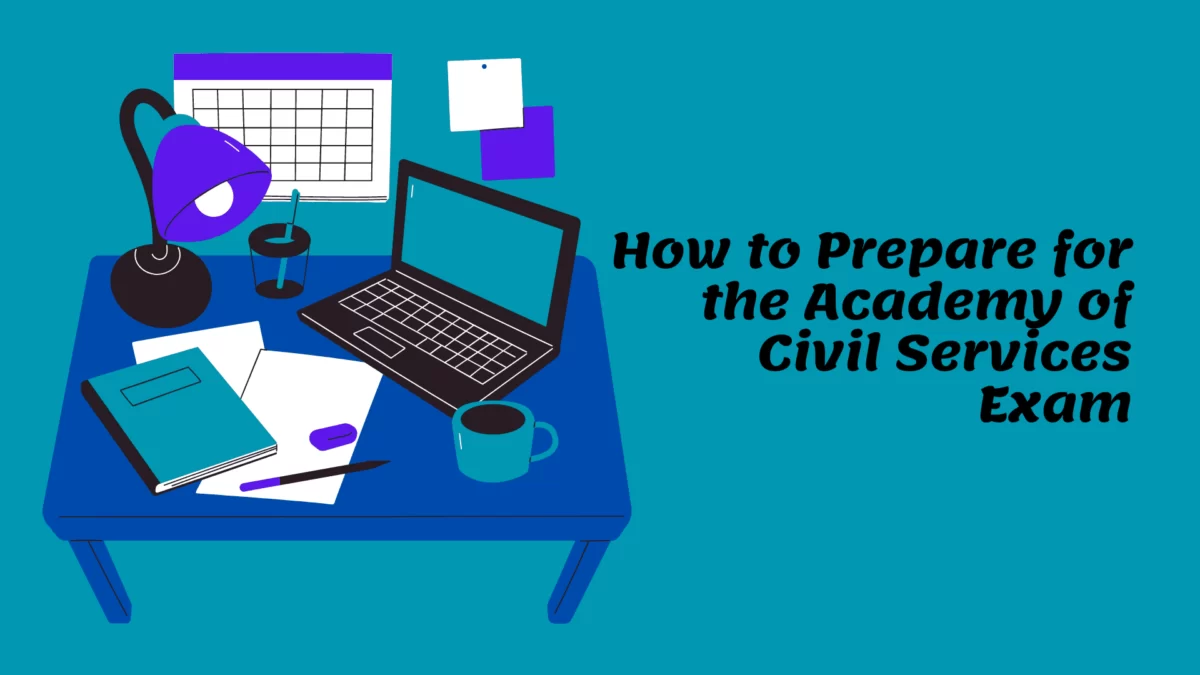One of India’s toughest and most difficult exams is the Academy of Civil Services Examination (CSE). Only a select few are chosen for various positions in the Indian government each year, even though thousands of individuals apply each year.
How Can You Enter the Academy of Civil Services Exam?
To pass this exam in one attempt and join the public service is the goal of many. But for many, getting ready for the CSE can seem overwhelming. To succeed, one must put in a lot of effort, be committed, and also employ the appropriate tactics. We’ll be providing some insightful advice in this in-depth guide that will enable you to pass the CSE in one attempt.
We’ve got you covered on everything from creating a study plan and time management techniques to comprehending the exam format and material. So continue reading if you’re committed to passing the CSE!
Introduction to the Civil Services Examination
The Union Public Service Commission (UPSC) of India administers the Civil Services Examination, also known as CSE, which is a national-level competitive examination. It regards as one of the most difficult tests in the world, and passing it is a sought-after accomplishment for many hopeful candidates.
The Preliminary Exam, the Main Exam, and the Personality Test are the three stages of the Exam (interview). Every applicant should be familiar with the whole UPSC CSE exam in full form, and if you don’t search on the internet; you may find out information on what is CSE in UPSC.
Many civil service positions in the Indian Administrative Service (IAS), Indian Police Service (IPS), Indian Foreign Service (IFS), and other Group A and Group B services of the Indian government file through the CSE, which is an examination.
Working diligently, being committed, and making wise preparations are all necessary to pass the CSE exam. Anyone can pass the exam and fulfill their dream of working for the government in a prominent civil service position with the proper training and strategy.
Eligibility for the Civil Services Examination
Understanding the eligibility requirements is crucial before you begin studying for the Academy of Civil Services Examination (CSE). This will prevent you from wasting crucial time and effort while assisting you in determining whether you are qualified to take the exam. Also, Education requirements, age restrictions, and nationality are all part of the CSE qualifying requirements.
The applicants must be citizens of India, Nepal, Bhutan, or Tibet (who migrated to India before 1962). As of August 1 of the examination year, they also needed to be at least 21 years old and not older than 32 years old, with some exceptions made for applicants from reserved categories.
Candidates should have a bachelor’s degree from any reputable university to consider. Applicants who are in their final year of school can still apply for the exam, but they must provide documentation that they have earned their degree. Application Form in Detail (DAF).
It is significant to note that the requirements for eligibility may occasionally change. Thus it advises verifying the official announcement of the exam each year before applying. You can concentrate on the exam preparation to pass the CSE in one attempt if you are certain that you match the eligibility requirements.
Tips to Crack the Preliminary Examination
Many applicants have the dream of passing the Civil Services Examination, but only a select few are successful in doing so in one go. Also, The Preliminary Examination is the initial part of this test, and passing it is necessary to move on to the next step. Here are some pointers to help you pass the preliminary exam on your first try:
1. Know the Exam Pattern and Syllabus
Knowing the exam’s syllabus and pattern is the first step in passing any exam. The Civil Services Aptitude Test and General Studies papers make up the Preliminary Examination (CSAT). Also, You can make an appropriate study plan by being aware of the syllabus and exam format.
2. Focus On Current Affairs
On the preliminary exam, current events are quite important. Ensure that you keep up with the most recent news and events. To keep up with current events, you can read newspapers, watch news channels, or follow reputable web sources.
3. Practice Mock Tests
Perfectionism is attained via practice. To obtain a sense of the real test, complete as many practice exams as you can. You will be better able to manage your time, comprehend the exam format, and increase your speed and accuracy as a result.
4. Revise Regularly
Success is achieved via revision. Make careful to regularly review all you have learned. Also, This will assist you in memorizing the material and retaining it for a longer time.
General Tips To Crack The Civil Services Examination In One Attempt
Many aspirants dream of passing the Civil Services Examination (CSE) on their first try. That is not, however, a simple task. Also, The CSE is regarded as one of the most difficult tests in India and calls for months of committed study and preparation. We will go over some general advice in this section that will enable you to pass the CSE in one attempt.
- First and foremost, it’s critical to have a positive outlook and confidence in oneself. You will need to put in a lot of effort and devotion to pass this exam, but if you remain motivated and concentrated, you can succeed.
- Second, having a well-thought-out approach is crucial. Start by carefully comprehending the exam format and syllabus. Make a comprehensive study schedule that allotted ample time to each subject. Also, Make sure your strategy includes regular breaks and time for review.
- Thirdly, exercise is important. Try to complete as many practice tests and question papers from prior years as you can. You will be better able to comprehend the exam format and become acclimated to the time limits as a result.
- Finally, keep up with current events. Regularly read newspapers, periodicals, and news channels. You will gain from this not only in the preliminary stage but also in the main stage and interview stage.
Wrapping Off
One of the most difficult exams to study for in India is the Academy of Civil Services Examination. Yet, we are certain that you can succeed if you use the advice and techniques in this manual. The Civil Services Test asks you about your personality, attitude, and values in addition to your knowledge.
We hope that our comprehensive guide to passing the Civil Services Test on your first try was helpful. We’re confident that if you bear these in mind, you’ll be able to accomplish your objectives. Join us in reading more.
Frequently Asked Questions
1. What Is CSE Exam Full Form?
Ans. – The UPSC CSE exam full form is Civil Services Examination.
2. What Is CSE In UPSC?
Ans. – CSE stands for civil services examination in UPSC.
3. What Is AIS?
Ans. – All India Services is the abbreviation. It includes the Indian Administrative Service (IAS), Indian Police Service (IPS), and Indian Forest Service, three of India’s most esteemed public services (IFS).








